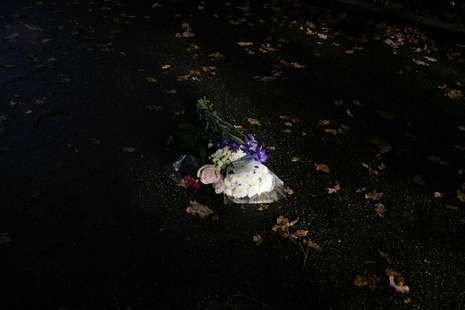Paloma Polo
dal 3/12/2008 al 3/1/2009
Segnalato da
3/12/2008
Paloma Polo
De Inkijk, SKOR, Amsterdam
The Precarious State. The installation showcases what appears to be the result of a mass act. An accumulation of flowers spontaneously collected in this urban space physically locates the happening of an event, opening up variable narratives. The drying out (and dying) of these referents is what will be left to witness.

For The Precarious State SKOR has commissioned artists Eliza Newman-Saul, Paloma Polo, Katarina Zdjelar and Noa Giniger to develop an art project that reflects upon the concept of identity. The second project in the series is an installation by artist Paloma Polo (Spain, 1983). The installation will showcase what appears to be the result of a mass act. An accumulation of flowers spontaneously collected in this urban space physically locates the happening of an event, opening up variable narratives. The drying out (and dying) of these referents is what will be left to witness.
The Precarious State
The concept of national identity dominates the public arena. Indeed, language; nationality; religion; a collective past; and shared values, give people “a sense of belonging”. And yet, in this era of migration and globalization, it is still necessary to consider the possibilities of constructing one’s identity and establishing oneself in a foreign environment. According to Nicolas Bourriaud, the era of radicality (“radical” in the sense of having roots) is over. Rather, what lies ahead is personified by the radicant: “instead of returning to origins it will let its roots grow in keeping with its forward movement.[...] The radicant does not inhabit an ideal structure [...], but rather a precarious state. It constructs its route from what it finds.”1
SKOR believed that it would be interesting to approach the concept of cultural identity from this angle. Accordingly, the four artists have examined the issue by using the below questions as guidelines:
·What kind of path must/can someone follow in order to rebuild his/her identity?
·Which mechanisms are at work to allow individuals to feel like they belong to a group?
·Could De Inkijk function as a “space of translation” (according to Bourriaud “a common place including me and the other”)?
With The Precarious State, SKOR questions whether there are any new angles from which to view the concept of identity.
De Inkijk, SKOR
Ruysdaelkade 2 - Amsterdam



